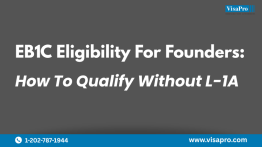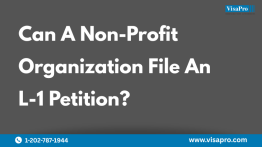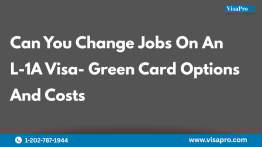L-1 And H-1B Reform Law (Omnibus Appropriations Bill, 2005)
The Fiscal Year 2005 Omnibus Appropriations Bill was approved by both the House and Senate on November 20, 2004. The Bill introduces many changes in the existing provisions relating to work visas, such as: restoration of One-Year experience requirement for L-1 Blanket entrants; re-institution of H-1B Fee and H-1B Dependent attestations, Introduction of a new Anti-Fraud Fee on L-1s and H-1Bs; and opening up more H-1Bs for certain applicants.
It is important to note that the Bill will become law only when it signed into law by the President. Therefore, none of the provisions of the bill will apply until it becomes law. Further, most of the H-1B related provisions will be effective 90 days after the Bill is signed into law, except certain provisions (related to fees) that will be effective immediately. The L-1 provisions will not be implemented until 180 days after the signing of the Bill into law. The key highlights of the Omnibus Appropriations Bill containing the H-1B and L-1 Visa Reform are discussed below.
A. Changes In H-1B Visa Program
New H-1B exemption
The Bill throws up an additional 20,000 of the coveted H-1B visas. This news generated a lot of excitement and our office has been flooded with calls enquiring whether the FY 2005 H-1B cap has been raised. In fact, various newspapers and journals, particularly in India, carried news reports that the H-1B cap has been raised by 20,000. While it is true that the legislation has opened up more H-1B visas, the caveat lies in the fact that these visas will be available only to certain qualifying applicants, and then, they won’t be available until three months after the Bill is signed by the President into law. These 20,000 new visas will be reserved for foreign students who have earned Master’s or higher degree from American universities or institutes of higher education. The annual cap will remain at 65,000. The proposed 20,000 H-1B visas will be treated as an exemption from the cap.
Additional H-1B Fees
Though the bill provides for relief to certain H-1B applicants from the H-1B cap, this relief comes with an expensive price tag in the shape of reinstatement and increase of the worker ‘retraining’ fee and the introduction of a new anti-fraud fee.
Education and Training Fee: The Bill reinstates and increases the Education and Training Fee. The employer-funded fee increases to $1500 (previously $1000), is separate from, and in addition to the regular USCIS filing fee and the optional $1000 premium processing fee. Employers with fewer than 25 full-time equivalent employees will only be required to pay half of the fee, i.e., $750. This Education and Training Fee is to be paid by the petitioning employer and cannot be charged back to the beneficiary.
New Anti-Fraud Fee: The Bill also introduces a new $500 anti-fraud fee to be paid by the employer at the time of initial H-1B or L-1 petitions. The fee will be imposed only on the principal alien and not on the dependent spouse or children.
Prevailing Wage Changes
The Bill also modifies Section 212(p) of the Immigration and Nationality Act to require employers to pay 100 per cent of the prevailing wage. Previously the provisions permitted 5% variance from the prevailing wage determinations for H-1B cases and in the labor certification process. However, the good news is that the Bill also mandates that where a governmental survey to determine prevailing wage (such as the Online Wage Survey) is made available to employers by the Department of Labor, such survey shall provide 4 levels of wages commensurate with experience, education and the level of supervision. Alternatively, a formula will be provided to calculate the 2 additional intermediate levels.
DOL Investigative Authority
The Omnibus bill also contains provisions expanding the Department of Labor’s investigative authority to conduct an investigation if it receives credible information providing reasonable cause that the employer has committed a willful failure to meet a condition.

B. Changes In L-1 Visa Program
No subcontracting of employees
The Bill modifies the provisions to prevent an L-1B holder from being primarily stationed at another employer’s worksite in the case where:
- The L-1B visa holder will be under the control and supervision of an unaffiliated employer;
- The L-1B visa holder will be providing labor for the third party rather than providing a product or service involving specialized knowledge specific to the petitioning employer.
These changes will apply to initial, extended or amended petitions filed on or after the effective date, i.e., 180 days after the President signs the Bill into law.
While this is a significant change from the existing law, USCIS has been attempting to bring this type of review into the process for a couple of years now.
L-1 Blanket – one year work requirement
The Bill also strikes out the provision permitting the six-month requirement of continuous employment abroad to receive L-1 status under an L-1 Blanket petition. All visa applicants under the L-1 Blanket must once again meet the one-year requirement applicable to all other L-1 applicants.
$500 Anti-Fraud Fee
The Bill also introduces a new $500 anti-fraud fee to be paid by the employer at the time of initial L-1 petition or a change of status application, in addition to the regular USCIS filing fees. The fee will be imposed only on principal alien. Visa applicants under an L-1 Blanket will also be required to pay the fee at the U.S. Consulate.
Note: The Fiscal Year 2005 Appropriations Act was signed by the President on December 8, 2004. For further information click here.
Conclusion
The changes proposed in the Omnibus Appropriations Bill will have a far-reaching impact on H-1B and L-1 visas. We at VisaPro are keeping track of these proposed changes and will continue to update you when the Bill becomes a law.
If you have any questions regarding H-1B and L-1 visa filings, contact our best immigration lawyers immediately for a FREE Immigration Attorney Consultation.
What VisaPro Customers Are Saying
Knowledgeable, fast, courteous, efficient are all words that describe the services I received from VisaPro. They were very helpful in all phases of the H-1B visa process and they got it right the first time. I have tried other Visa services, but VisaPro is the best by far. VisaPro is the only way to go!"
 Raymond Meyers, President, EBOZ, Inc
Raymond Meyers, President, EBOZ, Inc



